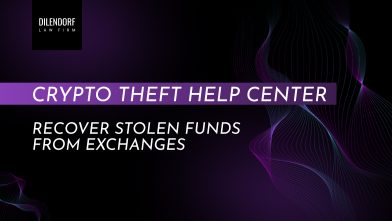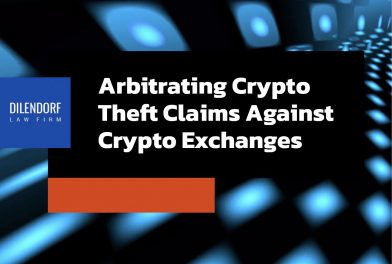How to Prove Source of Funds in EB-5 Cryptocurrency Cases: Issues Raised by Immigration Services (USCIS)
About the Authors: Max (Maksim) Dilendorf, Esq., founding partner of the Dilendorf Law Firm (New York).
Natalia Polukhtin, Esq attorney at Global Practice, specializes in investment immigrant and non-immigrant visa categories. Native to Moscow, Russia, Natalia earned her graduate and undergraduate degrees from Moscow State University before obtaining a law degree from Mercer University School of Law. During her legal career, Natalia received multiple professional recognitions, including being listed among Top 5 “Rising Stars” immigration attorneys in the U.S. for investment immigration. As an immigrant herself, Natalia successfully and effectively represents her clients throughout the immigration process by utilizing her foreign language skills and multicultural heritage. She is a blogger, speaker, and author of the first-ever written in Russian comprehensive guide to business immigration to the U.S.
One clear signal that cryptocurrency is becoming ubiquitous is its growing incidence as the source of funds for foreign citizens who wish to invest in the US economy. As cases involving petitioners paying for EB-5 with Bitcoin become more common, questions have been raised about what to expect from U.S. Citizen and Immigration Services (USCIS) and what kind of questions to expect from adjudicators.
According to OFAC, the IRS, the FTC, FinCEN, CFTC, and many individual U.S. states, the use of Bitcoin, Ethereum, and other virtual currencies as a legitimate form of payment has been litigated and proven valid. In fact, cryptocurrency businesses must be licensed just like any other money services business and regulated as non-bank financial institutions. However, USCIS has presented roadblocks for EB-5 applicants as they attempt to prove cryptocurrency as a lawful source of funds.
This article aims to educate EB-5 petitioners about the process of proving “source of funds” by providing real-world examples and solutions to common issues among cryptocurrency investors.
What are the responses applicants can expect from USCIS after filing
an I-526 petition?
Known as the “I-526 Immigrant Petition by Alien Entrepreneur” this EB-5 petition is filed by a foreign investor “to demonstrate that they are in the process of investing or have already invested the required amount of capital in a suitable EB-5 project.” Additionally, the petition requires applicants to prove that the source of funds used to finance such an investment were obtained legally.
Based on our recent involvement in EB-5 cases, the Dilendorf Law Firm has encountered a variety of legal arguments from USCIS, many of which demonstrated an alarming lack of knowledge about the mechanics of the blockchain and the inherent traceability of crypto transactions.
When the sale of digital assets leads to the investor’s possession of funds for a “new commercial enterprise” (“NCE funds”) the USCIS often denies applications based on a deficit of knowledge. As attorneys specializing in EB-5 and other business transactions related to cryptocurrency, we educate the adjudicators by mapping out a logical, consistent, and transparent sequence of transactions.
Here are a few examples of USCIS responses from recent EB-5 cases:
- Inconsistencies of data submitted in the form of bank statements, such as where certain statement time periods were missing and thereby excluded the evidence of transfers from one account to another, when the purchase of BTC would have been recorded.
- Changing or inconsistent accounts of the source of NCE investment funds, such as whether they were traceable to one set of BTCs or another and purchased during specific time periods of legal employment or another. (USCIS claims that any inconsistencies in reporting call into question all other assertions made by the petitioner.)
- Evidence of ownership provided includes the use of “digital signatures” (which USCIS claims do not contain sufficient evidence of authenticity.)
- The petitioner’s inclusion of a legal opinion or investigative reporting that maintains a deliberately “cautious and qualified tone with respect to conclusions regarding the lawfulness of the sourcing and path of Petitioner’s NCE investment funds.”
- The applicant’s RFE response fails to establish by a preponderance of the evidence that Petitioner is the owner of the wallet account for which Petitioner provided transaction records over a specific time period, as claimed. (Evidentiary insufficiencies regarding Petitioner’s ownership of a specific account containing digital assets are relevant because they raise doubts as to the lawfulness of the funds/assets contained therein.)
In addition to the USCIS’ claims of inconsistencies in data pertaining to sources of NCE funds, the agency’s adjudicators often demonstrate very little knowledge of digital signatures, wallet ownership, and cryptocurrency trading platforms, such as Coinbase.
In a recent exchange about the validity of a petitioner’s Coinbase account, the USCIS incorrectly asserted the following, demonstrating a clear lack of understanding in every nuance of the case.
- “The photographic link is insufficient to establish Petitioner’s ownership of the Coinbase account and connection to the listed addresses purportedly linked to Petitioner’s Coinbase account wallet.”
- “Coinbase transaction records do not contain Petitioner’s photograph, legal name, date of birth, or other unique personal information lack the identifiers commonly present on financial institution transaction records, and which identifiers are used to establish account ownership.”
After providing legal opinions on several cases involving a petitioner’s use of Coinbase, our opinion is that many of the adjudicators at USCIS are unsure about the use of crypto wallets, uniquely identifiable addresses, or how Bitcoin can be moved from one wallet into another. They also lacked knowledge about Coinbase’s compliance with U.S. anti-money laundering (AML) and know-your-customer (KYC) laws.
Accordingly, the USCIS may conclude that “The Petitioner failed to meet Petitioner’s burden of proof in demonstrating by a preponderance of the evidence that Petitioner’s investment capital derives from lawful sources.”
What can be done to avoid delays in processing and approval of an EB-5 application?
By mapping out detailed and chronological documentation and using logical explanations, an experienced attorney can ensure that Bitcoin and other digital assets are approved as a lawful source of funds by USCIS. Our team is well-versed in the most effective methods of educating USCIS adjudicators to inform their opinions.
Standard of proof: A preponderance of evidence
How far does a petitioner and his or her attorney need to go with documentation? The USCIS standard is a “preponderance of evidence”, proving that a claim is “more likely true than not.”
In addition, showing a petitioner is compliant with prevailing digital exchange regulations and has a professional history that appears consistent with cryptocurrency trading can help support the case. An investment portfolio that shows that the petitioner is a savvy trader is also a plus.
Keep in mind, however, all the evidence in the world may not be sufficient if it is not presented clearly and carefully, with an eye toward helping adjudicators see the full picture. We call this process “forensic documentation.”
Careful planning is key to forensic documentation
Ideally, the EB-5 practitioner looking to apply proceeds from a cryptocurrency sale to an NCE investment will contact an attorney who is experienced in these matters before converting digital tokens or coins into traditional currency or other monetary instruments.
- Whenever possible, planning and structuring the transaction appropriately will close some of the knowledge gaps that naturally occur in the cryptocurrency industry due to the imputed anonymity of blockchain technology.
- When a petitioner presents credible evidence in support of proving a particular fact, USCIS should conclude that he or she has satisfied the burden of proof, provided that no contradicting evidence is available.
- In addition to transactional histories, we recommended that an investor create a “portfolio” that highlights his or her credibility as a sophisticated businessperson and trader, capable of making wise decisions in the handling of digital assets, either personally or through an agent.
Absent a definitive policy and established precedent, it is difficult to predict with any certainty how each piece of evidence presented to support the “source of funds” for wealth derived from cryptocurrency, or what will be accepted by the adjudicator. However, our experience-based approach is far more likely to succeed.
What are the EB-5 “Source of Funds” Requirements?
Cryptocurrency is relatively new to USCIS, so they are still trying to find ways to prove it represents a lawful source of funds. The primary reason for their seemingly overcautious attitude is their belief that an adjudicator may make an adverse decision about the legitimacy of funds, simply because they lack an understanding of these novel currencies and accompanying regulations.
- Two very specific sources must be proven, but both require a very detailed approach, including diagramming the flow of funds leading up to the applicant’s current financial status.
- One must address the method by which the petitioner acquired the Bitcoins, or other cryptocurrency, including when, where, and how the purchased was financed, the amount of the initial investment, etc.
- Additionally, one must document when, where and how the Bitcoins were converted (sold) to hard currency, along with all the necessary documentation associated with the sale.
Details are very important here, and should always include the name of purchaser, how the Bitcoins were sold, the amount realized, proof of compliance with laws of the jurisdiction where the sales took place, including payment of appropriate taxes, and compliance with appropriate securities laws.
It is strongly advised that a petitioner consult with legal and financial experts associated with digital assets, who can assist in assembling the necessary documentation.
What are some of the questions one can expect from USCIS?
Cryptocurrency continues to be a problematic source of funds for EB-5 petitioners. As a result, applicants can expect questions to fall into certain categories.
- Traceability: when the funds used to purchase the digital assets were not traceable, due to a lack of documentation, missing bank statements, paystubs, or inconsistencies in these documents.
- Ownership: The petitioner’s digital wallets must be attributable to him or her, and the digital assets contained in such wallets must be traceable to the initial purchase and supported by documentation.
- Understanding: The adjudicator’s lack of knowledge about how blockchain technologies work, including digital signatures, keys, wallets, and transactional histories.
- Missing information: This could include everything from gaps in timing to missed transactions leading up to the conversion to hard currency. It could also include lack of identifying information on accounts attributed to the investor.
- Vagueness: When providing investigative reports or legal opinions, it is important to use language that supports a “preponderance of evidence”. Avoid words like “reasonably” or “presumptively”. USCIS has been known to question a “deliberately cautious and qualified tone with respect to conclusions regarding the lawfulness of the sourcing and path of Petitioner’s NCE investment funds.”
- Compliance: Proof that any financial institutions involved in the conversion of a petitioner’s cryptocurrency assets into the EB-5 investment are fully compliant with all cryptocurrency, money transmitter, and KYC/AML regulations.
What are the best practices for proving EB-5 funds were earned legally?
Recent experience with USCIS indicates that persuasive documentation and detailed explanations of underlying transactions can be used successfully to make the case for a lawful source of funds when cryptocurrency proceeds were used to finance the qualifying investment.
Where were the assets traded?
Making a legitimate claim to substantiate the source of funds will begin with the jurisdiction where the investor made the trade. As this could potentially become an issue, it must be carefully analyzed and deconstructed.
- Documents pertaining to the origination and trade of cryptocurrency would not be available from countries where cryptocurrency is subject to a nationwide regulatory ban.
- Examples of such jurisdictions include Algeria, Bolivia, Morocco, Nepal, Pakistan, and Vietnam. Other countries, such as Bahrain and Qatar prohibit domestic cryptocurrency exchanges. Also, Bangladesh, Colombia, Iran, Lithuania, Lesotho, and Thailand prohibit financial institutions from facilitating trades involving virtual currencies.
- In addition, it may be difficult to identify the record originated in the jurisdictions where cryptocurrency is permitted, or at least not expressly prohibited.
Different jurisdictions will focus on specific aspects of regulation, such as applying securities laws, taxes, anti-money laundering implications and reporting requirements.
For example, the paper trail generated by the acquisition of Bitcoin in Switzerland will be quite different from the documentation generated in Russia. This is because Switzerland offers one of the most lenient climates for digital currency exchange, while in Russia it falls outside of government-prescribed reporting requirements.
Another key to documenting the source of funds is to identify how crypto is classified within a particular country’s regulatory framework (money, asset, commodity, etc.) Depending on the classification, it may be possible to obtain purchase agreements or tax documents that reflect either capital gains or ordinary income, consistent with the manifested digital trade.
Mapping the conversion process
By understanding the status of a virtual asset trade in a specific jurisdiction, it is possible to “map” the conversion process from cryptocurrency into a traditional instrument of payment.
Included in this documentation should be:
- A complete history of transactions, and any history of “mining” Bitcoin.
- Proof of how funds were acquired to buy the equipment needed to trade, including receipts.
- Documentation of how the initial investment was lawfully earned.
- Tax documents or other financial documentation reflecting the capital gains or other income associated with the digital trade.
Simplifying the process for Immigration Services
It is recommended that a petitioner err on the side of over-documenting and extends the effort to educate the USCIS adjudicator.
- The best way to illustrate this is to simplify the exchange for the adjudicator by describing it in terms usually applicable to conventional financial transactions.
- For example, most investors derive profits from purchasing cryptocurrency at a lower price and then later selling it at a higher price, just like any other investment.
- Collateral evidence can also be used to establish a nexus between a petitioner’s accumulated wealth and particular transactions converting digital assets into cash. An example of this is how the proceeds of the sale can be matched up to the “fair market value” of the Bitcoin at the date payment was received, and later linked to the income reported in the investor’s tax returns.
- Petitioners using cryptocurrency exchanges, such as Coinbase, may be able to corroborate evidence using CSV files, or cryptocurrency data shown in spreadsheet form that is downloaded directly from the trading platform.
How does the petitioner know if their documentation is sufficient?
As mentioned above, the legal standard utilized in consideration of EB-5 petitions is a “preponderance of evidence”. This means the evidence must demonstrate presentation of probative and relative materials that the claim is “probably true” or “more likely than not” to be true.
The easiest way to meet this standard is by collecting documentation that follows the domestic regulations of digital exchange markets.
Another element is proving that the practitioner’s overall wealth, accumulated through the cryptocurrency trade, is consistent with his or her background, education, or professional education.
Conclusion
Thousands of digital currencies are currently in circulation, with values exceeding one trillion dollars. Not surprisingly, this amount of volume represents an enormous pool of available investment capital, but up until recently it was not generally used for payments or value exchanges.
While no handbook exists to explain exactly how digital assets should be documented as a source of funds, two things are indisputable: Cryptocurrency is here to stay, and it will be offered more and more frequently as the basis of an EB-5 investment. As the volume of investment capital derived from the trade of virtual currencies increases, it will have positive implications for local, national, and global economies, making it more widely accepted by USCIS.
The Dilendorf Law Firm provides an experienced legal team of EB-5 specialists to help our clients present a persuasive, accurate, and seamless case to USCIS.
Resources:
- EB-5 Immigrant Investor Program | USCIS
- EB-5 Filings Tips
- USCIS EB-5 Resources
- Processing Times Information
- About the EB-5 Visa Classification
- USCIS Questions and Answers: EB-5 Economic Methodologies
- USCIS EB-5 Support Center
- Citizenship for Sale: Oversight of the EB-5 Investor Visa Program
- USCIS Proposes Rules Increasing Minimum Investment Thresholds for the EB-5 Immigrant Investor Program
- EB-5 Policy Manual
- Bitcoin: Technical Background and Data Analysis
- Beyond Silk Road: Potential Risks, Threats and Promises of Virtual Currencies
- Future of Cryptocurrency: Countering Fraud and Regulating Digital Assets
- Storing and Querying Bitcoin Blockchain Using SQL Databases
- Hearing Before the Senate Homeland Security and Governmental Affairs Committee, Beyond Silk Road: Potential Risks, Threats, and Promises of Virtual Currencies
- UK National Risk Assessment of Money Laundering and Terrorist Financing
- Investigating Terrorist Financing with Chainalysis Reactor
- Exploring the Cryptocurrency and Blockchain Ecosystem: Testimony for the Hearing of the US Senate Committee on Banking, Housing and Community Affairs
- FinCen, Applications of FinCen’s Regulations to Persons Administering, Exchanging or Using Virtual Currencies
- Comments to the Federal Elections Commission on Technological Modernization
- Blockchain Applications for Homeland Security Forensic Analytics
- Law and Blockchain
- Cryptocurrency Investigations for Financial Professionals
- Anti-Money Laundering and Countering the Financing of Terrorism










